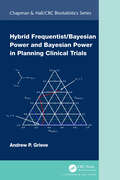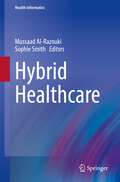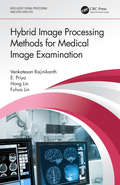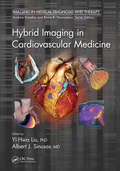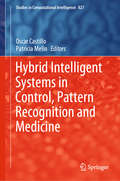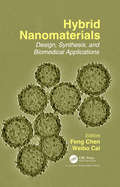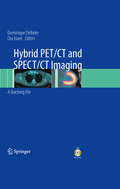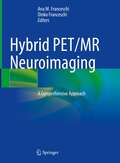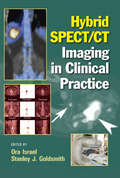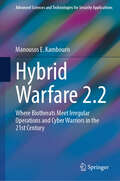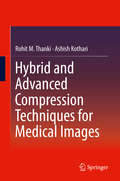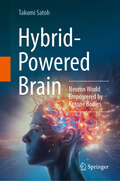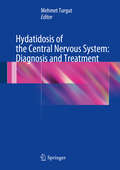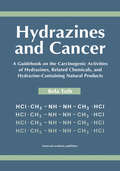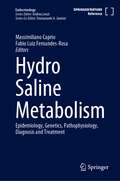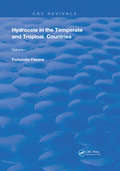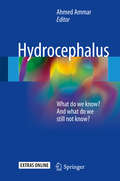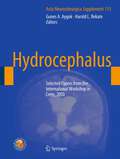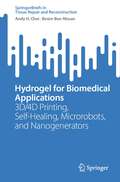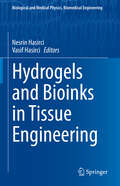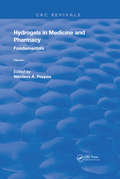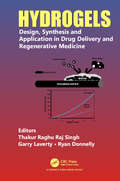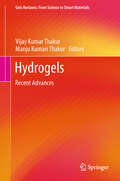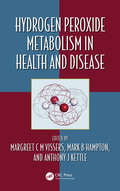- Table View
- List View
Hybrid Frequentist/Bayesian Power and Bayesian Power in Planning Clinical Trials (Chapman & Hall/CRC Biostatistics Series)
by Andrew P. GrieveHybrid Frequentist/Bayesian Power and Bayesian Power in Planning Clinical Trials provides a practical introduction to unconditional approaches to planning randomised clinical trials, particularly aimed at drug development in the pharmaceutical industry. This book is aimed at providing guidance to practitioners in using average power, assurance and related concepts. This book brings together recent research and sets them in a consistent framework and provides a fresh insight into how such methods can be used.Features: A focus on normal theory linking average power, expected power, predictive power, assurance, conditional Bayesian power and Bayesian power. Extensions of the concepts to binomial, and time-to-event outcomes and non-inferiority trials An investigation into the upper bound on average power, assurance and Bayesian power based on the prior probability of a positive treatment effect Application of assurance to a series of trials in a development program and an introduction of the assurance of an individual trial conditional on the positive outcome of an earlier trial in the program, or to the successful outcome of an interim analysis Prior distribution of power and sample size Extension of the basic approach to proof-of-concept trials with dual success criteria Investigation of the connection between conditional and predictive power at an interim analysis and power and assurance Introduction of the idea of surety in sample sizing of clinical trials based on the width of the confidence intervals for the treatment effect, and an unconditional version.
Hybrid Healthcare (Health Informatics)
by Sophie Smith Mussaad Al-RazoukiThis essential book reviews how digital health ventures can be integrated with more traditional techniques to revolutionize the healthcare system. Details of the current state of the digital marketplace, the available tools for early detection and diagnostics that presently employ digital technologies are provided. Relevant aspects of blockchain, artificial intelligence including data lake development and data analytics are described. The role of regulators and legislation including GDPR are also covered. Hybrid Healthcare provides a thorough overview of how digital health entrepreneurs will need to employ a hybrid approach to address many healthcare challenges of the 21st century. It is therefore an indispensable resource for all those seeking to develop their knowledge of this rapidly growing sector.
Hybrid Image Processing Methods for Medical Image Examination (Intelligent Signal Processing and Data Analysis)
by Hong Lin Venkatesan Rajinikanth E Priya Fuhua LinIn view of better results expected from examination of medical datasets (images) with hybrid (integration of thresholding and segmentation) image processing methods, this work focuses on implementation of possible hybrid image examination techniques for medical images. It describes various image thresholding and segmentation methods which are essential for the development of such a hybrid processing tool. Further, this book presents the essential details, such as test image preparation, implementation of a chosen thresholding operation, evaluation of threshold image, and implementation of segmentation procedure and its evaluation, supported by pertinent case studies. Aimed at researchers/graduate students in the medical image processing domain, image processing, and computer engineering, this book: Provides broad background on various image thresholding and segmentation techniques Discusses information on various assessment metrics and the confusion matrix Proposes integration of the thresholding technique with the bio-inspired algorithms Explores case studies including MRI, CT, dermoscopy, and ultrasound images Includes separate chapters on machine learning and deep learning for medical image processing
Hybrid Imaging in Cardiovascular Medicine (Imaging in Medical Diagnosis and Therapy)
by Yi-Hwa Liu Albert J. SinusasThis comprehensive book focuses on multimodality imaging technology, including overviews of the instruments and methods followed by practical case studies that highlight use in the detection and treatment of cardiovascular diseases. Chapters cover PET-CT, SPECT-CT, SPECT-MRI, PET-MRI, PET-optical imaging, SPECT-optical imaging, photoacoustic Imaging, and hybrid intravascular imaging. It also addresses the important issues of multimodality imaging probes and image quantification. <P><P>Readers from radiology and cardiology as well as medical imaging and biomedical engineering will learn essentials of the field. They will be shown how the field has advanced quantitative analysis of molecularly targeted imaging through improvements in the reliability and reproducibility of imaging data. Moreover, they will be presented with quantification algorithms and case illustrations, including coverage of such topics such as multimodality image fusion and kinetic modeling. <P><P>Yi-Hwa Liu, PhD is Senior Research Scientist in Cardiovascular Medicine at Yale University School of Medicine and Technical Director of Nuclear Cardiology at Yale New Haven Hospital. He is also an Associate Professor (Adjunct) of Biomedical Imaging and Radiological Sciences at National Yang-Ming University, Taipei, Taiwan, and Professor (Adjunct) of Biomedical Engineering at Chung Yuan Christian University, Taoyuan, Taiwan. He is an elected senior member of Institute of Electrical and Electronic Engineers (IEEE) and a full member of Sigma Xi of The Scientific Research Society of North America. <P><P>Albert J. Sinusas, M.D., FACC, FAHA is Professor of Medicine (Section of Cardiovascular Medicine) and Radiology and Biomedical Imaging, at Yale University School of Medicine, and Director of the Yale Translational Research Imaging Center (Y-TRIC), and Director of Advanced Cardiovascular Imaging at Yale New Haven Hospital. He is a recipient of the Society of Nuclear Medicine’s Hermann Blumgart Award.
Hybrid Intelligent Systems in Control, Pattern Recognition and Medicine (Studies in Computational Intelligence #827)
by Oscar Castillo Patricia MelinThis book describes the latest advances in fuzzy logic, neural networks and optimization algorithms, as well as their hybrid combinations, and their applications in areas such as: intelligent control and robotics, pattern recognition, medical diagnosis, time series prediction, and optimization of complex problems. The book is divided into five main parts. The first part proposes new concepts and algorithms based on type-1 and type-2 fuzzy logic and their applications; the second explores new concepts and algorithms in neural networks and fuzzy logic applied to recognition. The third part examines the theory and practice of meta-heuristics in various areas of application, while the fourth highlights diverse applications of fuzzy logic, neural networks and hybrid intelligent systems in medical contexts. Finally, the fifth part focuses on applications of fuzzy logic, neural networks and meta-heuristics to robotics problems.
Hybrid Nanomaterials: Design, Synthesis, and Biomedical Applications
by Feng Chen Weibo CaiOver the last decade, an unprecedented expansion in the field of nanomedicine has resulted in the development of new nanomaterials for diagnosis and therapy of various diseases such as cancer. This book covers the design, synthesis and applications of various functionally-hybridized nanomaterials for biomedical applications. It includes strategies for design and synthesis of hybrid nanomaterials, surface engineering of various nanoparticle-based hybrid nanosystems for cancer imaging and therapy, toxicity aspects of nanomaterials and the challenges in translation research of hybrid nanomaterials.
Hybrid PET/CT and SPECT/CT Imaging
by Ora Israel Dominique DelbekeThis practical guide is a reference source of cases for images obtained on state-of-the-art integrated PET/CT and SPECT/CT imaging systems. It covers the full spectrum of clinical applications, including head and neck tumors, breast cancer, colorectal cancer, pancreatic cancer, and genitourinary tumors. In addition a wealth of illustrations reinforce the key teaching points discussed throughout the book.
Hybrid PET/MR Neuroimaging: A Comprehensive Approach
by Dinko Franceschi Ana M. FranceschiThis book serves as a reference and comprehensive guide for PET/MR neuroimaging. The field of PET/MR is rapidly evolving, however, there is no standard resource summarizing the vast information and its potential applications. This book will guide neurological molecular imaging applications in both clinical practice and the research setting. Experts from multiple disciplines, including radiologists, researchers, and physicists, have collaborated to bring their knowledge and expertise together. Sections begin by covering general considerations, including public health and economic implications, the physics of PET/MR systems, an overview of hot lab and cyclotron, and radiotracers used in neurologic PET/MRI. There is then coverage of each major disease/systemic category, including dementia and neurodegenerative disease, epilepsy localization, brain tumors, inflammatory and infectious CNS disorders, head and neck imaging, as well as vascular hybrid imaging. Together, we have created a thorough, concise and up-to-date textbook in a unique, user-friendly format. This is an ideal guide for neuroradiologists, nuclear medicine specialists, medical physicists, clinical trainees and researchers.
Hybrid SPECT/CT Imaging in Clinical Practice
by Ora Israel Stanley J. GoldsmithExploring a technology that is significantly impacting the noninvasive evaluation of the physiology and anatomy of tumors, as well as the diagnosis of infectious processes and cardiac diseases, this source presents recent advances and clinical applications of sequential, single session single-photon emission computed tomography and computed tomogra
Hybrid Warfare 2.2: Where Biothreats Meet Irregular Operations and Cyber Warriors in the 21st Century (Advanced Sciences and Technologies for Security Applications)
by Manousos E. KambourisThe concept of Hybrid Warfare has gained prominence in recent decades. It is a novel terminology, but the concept is detectable since antiquity: Ancient Chinese, Ancient Greeks and the Jews of Exodus were all well familiar, so well to have let us know. Similarly, bioagents have been used malevolently since always. What is novel is that these two, in the present context, are not only interfacing smoothly, but in an enhanced context: The Hybrid Warfare, which has now enriched its portfolio, from actions of provocation, insurgency, economic warfare, special operations, proxy warfare and social destabilization to the Residual domain, the cyberspace, while the conventional, 3D space expands. Now the Space and the Deep are included in the topography of the friction zone. In this, the bio- factor becomes not only relevant but also an amplifier: using the technology malevolently, all the advances made to combat disease may be used to cause, further, or perplex and complicate disease. Improved or totally novel or even alien germs may replace explosives in bombs, shells or suicidal /kamimaze drones and taint bullets and fragments. Microrobots may deliver cancer cells to targeted individuals to foster cancer, or specific supergerms for an infection to rage unchallenged. And what happens if the mechanism of these cancers and infections is intentionally provided with an Abort signal? Global extortions would become probable, not just possible. Far from Science Fiction, this dystopia becomes more probable by the day. The Artificial Intelligence simply makes it easier to occur. Technology allows manipulation and intervention in levels and extends only imagined in the Past, but the application of these capabilities is clearly of dual use, with the destructive potential leveraged by the complexity of the social and state structure. Within this book, we explore the “How” (occasionally the “What” also) in some of these instances. From cyber terrorists to aggressive bioindustrialists and “democratized” ballistic and cruise missile technology, it could be coined as "The Book of Modern Mayhem”.
Hybrid and Advanced Compression Techniques for Medical Images
by Rohit M. Thanki Ashish KothariThis book introduces advanced and hybrid compression techniques specifically used for medical images. The book discusses conventional compression and compressive sensing (CS) theory based approaches that are designed and implemented using various image transforms, such as: Discrete Fourier Transform (DFT), Discrete Cosine Transform (DCT), Discrete Wavelet Transform (DWT), and Singular Value Decomposition (SVD) and greedy based recovery algorithm. The authors show how these techniques provide simulation results of various compression techniques for different types of medical images, such as MRI, CT, US, and x-ray images. Future research directions are provided for medical imaging science. The book will be a welcomed reference for engineers, clinicians, and research students working with medical image compression in the biomedical imaging field. Covers various algorithms for data compression and medical image compression;Provides simulation results of compression algorithms for different types of medical images;Provides study of compressive sensing theory for compression of medical images.
Hybrid-Powered Brain: Neuron World Empowered by Ketone Bodies
by Takumi SatohThis book unlocks the secrets of a powerful and sustainable brain, as well as explores the concept of a hybrid-powered brain and the transformative potential of the "Small Ketogenic" system.Supplying the brain with an ample energy substrate is vital for a positive mindset and a fulfilling day. Adequate energy fuels sharp thinking and clear judgement, while an energy-deficient brain leads to a variety of problems. Low blood glucose levels make it difficult to remember and amplify negative emotions. Delve into the brain's often-overlooked energy system to avoid these situations.The human brain functions on two energy systems: glucose from carbohydrates and ketone bodies from fats. These systems complement each other, and activating the hybrid system is surprisingly simple. Adopting the "Small Ketogenic" means extending the intervals between meals and allowing for a slight feeling of hunger within a reasonable range. This approach preserves cognitive function to the maximum.Inspired by the longevity of individuals in certain villages, the hybrid-powered brain enhances mental vitality. These villagers lead vibrant lives fuelled by their powerful minds. Maintaining ketone body concentrations between 0.2-0.5 mM ensures an active and calm brain. By making slight adjustments in eating habits, and adopting the "Small Ketogenic", we can achieve healthy longevity. This sustainable approach boosts the brain and promotes optimal health effects.Embark on a transformative journey of self-improvement and discover the true potential of your brain. This book revolutionises the way you perceive and care for your brain, leading you to a sustainable and fulfilling cognitive existence.
Hydatidosis of the Central Nervous System: Diagnosis and Treatment
by Mehmet TurgutHydatid disease, a zoonotic infection caused by a tapeworm of the genus Echinococcus, has been encountered in various organs in humans. In spite of all the advances in imaging techniques and therapeutic methods, hydatidosis of the central nervous system is still a life-threatening condition in infested areas of the world. This is the first comprehensive reference book on hydatidosis of the central nervous system. It is written and edited by leading international authorities from infested areas and provides an in-depth review of diagnosis and management. Clinical and neuroradiological findings are extensively documented with the aid of numerous original photographs and the role of surgical intervention and chemotherapy is carefully appraised. In addition, future avenues and innovative therapeutic philosophies are discussed. This book will serve as an ideal source of up-to-date information for all with an interest in this debilitating disease.
Hydrazines and Cancer: A Guidebook on the Carciognic Activities of Hydrazines, Related Chemicals, and Hydrazine Containing Natural Products
by Bela TothThis comprehensive publication on biological actions of hydrazines includes all the available published material and chronological descriptions of the literature. The uniformly applied principle of evaluations separates each hydrazine chemical and divides according to species. This monograph presents data on carcinogenic activity of hydrazines in a
Hydro Saline Metabolism: Epidemiology, Genetics, Pathophysiology, Diagnosis and Treatment (Endocrinology)
by Massimiliano Caprio Fabio Luiz Fernandes-RosaThis book provides an overview of endocrine diseases associated with alterations of salt metabolism, with a focus on clinical and pathophysiological aspects. It covers various topics in the endocrine control of salt and water homeostasis, such as neuroendocrine determinants of water balance, adrenal hormone biosynthesis, hormonal function in target renal cells, and dysfunction of hormonal target effectors in the kidney. It also features an update on the clinical management of these diseases, including new diagnostic and therapeutic tools. Written by a combination of recognized and emerging experts in the field, this book is intended as a major reference work, not only for endocrinologists and nephrologists, but also for pediatricians, neonatologists, cardiologists, and emergency medicine and intensive care specialists, who can be faced with the management of endocrine diseases responsible of salt and water imbalance. The book is part of the SpringerReference program, which provides access to ‘living editions’ that are constantly updated using a dynamic, peer-review publishing process.
Hydrocele in the Temperate and Tropical Countries: Volume 1 (Routledge Revivals)
by Fortunato FasanaFirst published in 1983: This monograph is intended to collate hundreds of studies found in the literature; part of it consists of personal observations made and experience acquired in India, Uganda, and Kenya over the past 30 years.
Hydrocephalus
by Ahmed AmmarThis book provides the reader with a well-structured, comprehensive approach to hydrocephalus and related syndromes. It also addresses the ethical dilemmas of managing hydrocephalus, of which many neurosurgeons are unaware, and presents cutting-edge research genetic and pathophysiology research on hydrocephalus. The book presents a new classification for the Dandy Walker syndrome, based on a new understanding of different hydrocephalic problems. Further, it puts forward a wholly new theory on the pathophysiology and development of multiloculated hydrocephalus. This book helps the reader to devise a long-term strategic plan to treat patients, based on research of favorable long-term outcomes of hydrocephalus. It uniquely provides evidence-based approaches to managing hydrocephalus, presenting the experience and thoughts of renowned and highly experienced neurosurgeons from the USA, Canada, Japan, Europe and the Middle East.
Hydrocephalus
by Gunes A. Aygok Harold L. RekateThe contributions in this volume, presented at the 5th International Hydrocephalus Workshop in May 2010 in Crete, Greece, give the present state-of-the-art in timely diagnosis and treatment of hydrocephalus. The topics covered include advances in management of both pediatric and adult hydrocephalus, identifying shunt responders, clinical experiences in endoscopic third ventriculostomy, clinical trials, pathophysiology, experimental studies, and the new classification for hydrocephalus.
Hydrogel for Biomedical Applications: 3D/4D Printing, Self-Healing, Microrobots, and Nanogenerators (Tissue Repair and Reconstruction)
by Besim Ben-Nissan Andy H. ChoiThis book highlights the latest clinical research and advancements in 3D (bio)printing and 4D printing using stimulus-responsive hydrogels as well as the concept of self-healing and its amalgamation with 3D printed injectable cell-laden tissue constructs. It also explores the use of metal-free “click” chemistry and enzymes such as horseradish peroxidase, hematin, tyrosinase, and transglutaminase to obtain chemically crosslinked hydrogels and the in vitro and in vivo responses. Lastly, the book briefly examines the future of drug delivery and the potentials offered by microrobotics and self-powered devices based on triboelectric nanogenerators. This book caters to biomedical researchers and clinical practitioners working in tissue reconstruction and drug/therapeutic delivery.
Hydrogels and Bioinks in Tissue Engineering (Biological and Medical Physics, Biomedical Engineering)
by Vasif Hasirci Nesrin HasirciThis book offers an in-depth exploration of both natural and synthetic polymeric hydrogels and bioinks, with a focus on their groundbreaking use in medical applications, particularly in the production of 3D tissue constructs and organ models. It covers the science and applications of hydrogels, beginning with a foundational understanding of tissue engineering and scaffold types. It describes the versatile 3D printing techniques that bring bioinks to life, followed by in-depth analyses of natural and synthetic hydrogels. Special emphasis is placed on hydrogels that mimic the extracellular matrix, providing crucial insights for researchers working to create realistic tissue environments. From smart hydrogels with adaptive properties to injectable solutions and conductive formulations, this book highlights innovations that are transforming therapeutic strategies. The text also covers a range of biomedical applications, including hydrogels in controlled delivery systems, nerve, cartilage, bone, skin, and cornea therapies, and their use in producing contact and intraocular lenses. Meticulously curated by leading experts in the field, this volume bridges the gap between cutting-edge research and practical applications, making it an essential guide for advancing tissue engineering and regenerative medicine.
Hydrogels in Medicine and Pharmacy: Fundamentals (Routledge Revivals #1)
by Nikolaos A. PeppasFirst Published in 1986, this book offers a full, comprehensive guide to the application of hydrogels in medicine. Carefully compiled and filled with a vast repertoire of notes, diagrams, and references this book serves as a useful reference for students of medicine and other practitioners in their respective fields.
Hydrogels: Design, Synthesis and Application in Drug Delivery and Regenerative Medicine
by Thakur Raghu Singh Garry Laverty Ryan DonnellyHydrogels are crosslinked, macromolecular polymeric materials arranged in a three-dimensional network, which can absorb and retain large amounts of water. Hydrogels are commonly used in clinical practice and experimental medicine for a wide range of applications, including drug delivery, tissue engineering and regenerative medicine, diagnostics, cellular immobilization, separation of biomolecules or cells, and barrier materials to regulate biological adhesions. This book elucidates the underlying concepts and emerging applications of hydrogels and will provide key case studies and critical analysis of the existing research.
Hydrogels: Recent Advances (Gels Horizons: From Science to Smart Materials)
by Vijay Kumar Thakur Manju Kumari ThakurThis book discusses recent advances in hydrogels, including their generation and applications and presents a compendium of fundamental concepts. It highlights the most important hydrogel materials, including physical hydrogels, chemical hydrogels, and nanohydrogels and explores the development of hydrogel-based novel materials that respond to external stimuli, such as temperature, pressure, pH, light, biochemicals or magnetism, which represent a new class of intelligent materials. With their multiple cooperative functions, hydrogel-based materials exhibit different potential applications ranging from biomedical engineering to water purification systems. This book covers key topics including superabsorbent polymer hydrogel; intelligent hydrogels for drug delivery; hydrogels from catechol-conjugated materials; nanomaterials loaded hydrogel; electrospinning of hydrogels; biopolymers-based hydrogels; injectable hydrogels; interpenetrating-polymer-network hydrogels: radiation- and sonochemical synthesis of micro/nano/macroscopic hydrogels; DNA-based hydrogels; and multifunctional applications of hydrogels. It will prove a valuable resource for researchers working in industry and academia alike.
Hydrogen Peroxide Metabolism in Health and Disease (Oxidative Stress and Disease)
by Mark Hampton Margreet C Vissers Anthony J. KettleMuch of the biology of oxidative stress and oxidative signalling centres on the generation and handling of hydrogen peroxide. The overall aim for this book would be to provide an insightful and useful forum to assist with the understanding of the relevance of hydrogen peroxide generation and how this is managed in human biology. The target audience would be those who currently have an interest in the generation of ROS, but who do not have expertise in chemistry, as well as those experts in the chemistry of oxidative stress, but without detailed understanding of the biologically relevant setting. We would aim to bridge the gap in understanding between chemistry and biology.
Hydrogen Sulfide and its Therapeutic Applications
by Hideo KimuraThe metabolism of sulfur especially by sulfurtransferases had been intensively studied in mid 1900's. Three enzymes, cystathionine β-synthase (CBS), cystathionine γ-lyase (CSE) and 3-mercaptopyruvate sulfurtransferase (3MST) were found to have the capacity to produce H2S in vitro. However, H2S was recognized simply as a by-product of the metabolic pathways or as a marker for evaluating the activity of enzymes rather than as a physiological active molecule. In the late 1980's relatively high concentrations of sulfide were measured in the brain that led to the successive studies of identifying the physiological functions of H2S. Recently, the steady-state concentrations of H2S have been re-evaluated and found to be much less than that initially measured. However, despite these differences, such re-evaluations served to further confirm the existence of H2S in mammalian tissues. H2S is produced in almost every organ and plays various roles such as neuromodulation, vasodilation, insulin release, inflammation, angiogenesis and cytoprotection. The unregulated production of H2S and improper responses of target molecules are involved in the pathogenesis of various diseases. This book focuses on these topics as well as on the recent progress in the biology and the therapeutic development of this molecule.
